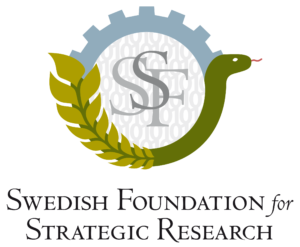Platform news
Dec. 16, 2025, 09:48
Apps and models on can now get assigned a DOI
Data science apps and ML models published on SciLifeLab Serve can now be assigned a Digital Object Identifier (DOI). DOIs are a primary persistent identifier used in scholarly communication. DOI provides a permanent link to the research output which does not change over time, meaning that readers can always reliably find it. Using DOIs in citations is important to attribute work correctly. They also allow to interlink related work with each other (for example, a dataset and an application that can be used to explore this dataset). Finally, having a DOI makes research output more discoverable because its metadata is available in the global DOI registry.
Many are familiar with using DOIs for articles, preprints, or datasets. SciLifeLab Serve now gives an option to issue and use DOIs for applications and models.
We are implementing automatic creation of DOIs for all apps and models added to SciLifeLab Serve. In the meantime, we can create DOIs manually for those who need them. end an email to serve@scilifelab.se, and we will help you.
Nov. 28, 2025, 13:47
Project file storage can be automatically increased to 5GB
Each project created on SciLifeLab Serve by default gets allocated 1 GB of file (data) storage. This storage can be used to upload files that can then be accessed or modified from the applications or from the notebooks (such as JupyterLab) within this project. From now on, each user will be able to increase this default storage allocation to 5 GB by clicking a button.
In order to increase the storage limit to 5 GB, go to the settings of your project, navigate to the tab "Storage" and press the button "Increase to 5GB". Any data that has already been uploaded to the project will stay intact.
As was the case before, if your project needs more than 5 GB of storage, please send us a request by either filling out the corresponding form or sending an email to serve@scilifelab.se. We consider and approve requests as fast as we can.
Oct. 13, 2025, 14:26
App authors can now see the number of requests to their apps
One of the most requested features from the application and model authors has been to be able to see statistics about how often their apps are used. With the most recent update to SciLifeLab Serve, this information is now displayed in the project dashboard.
Members of the project within which an app or a model has been added can now see the newly added column "Hits" that displays the number of different unique IP addresses that requested the application in the past 30 days. We plan to build on top of this and provide this information over a longer period of time in the near future.
Jun. 9, 2025, 17:36
Depictio now available in Serve
Depictio has been integrated into SciLifeLab Serve for some time, but with the latest Serve release (v3.4.0), now live, users can create Depictio apps directly from their project view. More details are available in the user guide.
Depictio is designed to help bioinformatics researchers make sense of complex datasets. Large-scale analyses often produce massive volumes of information that can be challenging to interpret. Depictio bridges this gap by automatically converting raw outputs into interactive, user-friendly dashboards.
This empowers scientists to visualize results, explore patterns, and extract insights with greater ease. As an open-source and flexible platform, Depictio adapts to diverse research needs and computational environments, offering a centralized solution for data visualization and interpretation in bioinformatics.
Apr. 11, 2025, 16:08
Serve Platform Surges Past 100 Apps, Empowering Life Science
SciLifeLab Serve is growing in content and attracting recognition as a key platform for publishing and sharing advanced machine learning models and apps – data science application services. To date, over 100 apps and models have been published on the platform, supporting Swedish data-driven life science. Recent developments include offering the possibility for tracking machine learning workflows, regardless of where training and analysis is carried out.
SciLifeLab is expanding its e-infrastructure to support AI-driven life science, with SciLifeLab Serve playing a key role in this transition. Since its beta launch in 2024, Serve has offered the Swedish life science community streamlined access to machine learning (ML) model serving, app hosting, and web-based development tools. The service is free for researchers at Swedish universities and institutions. The platform is also used by SciLifeLab itself to host tools and applications from the infrastructure units.
“To fully realize the potential of AI in life sciences, it is essential that models are not only developed but also made easily accessible to researchers through robust hosting and serving infrastructure. At SciLifeLab, providing scalable and open access to AI models and apps is a key part of our strategy to empower the scientific community and accelerate data-driven discoveries.”, says Ola Spjuth, AI Lead at SciLifeLab.
SciLifeLab Serve is a key component in SciLifeLab Data Centre’s growing ecosystem of services that facilitate Open Science and FAIR sharing of research outputs, complementing data repositories and open data portals. An important upcoming feature is persistent identifiers, such as DOI:s (Digital Object Identifiers), associated with each published item. Serve also provides the ability to keep items private during ongoing development and peer review.
Feel free to get in touch with us (serve@scilifelab.se).
Mar. 14, 2025, 09:23
Experiment tracking with MLFlow now available
You can now make use of MLFlow on SciLifeLab Serve to track your machine learning experiments. This feature was added in the latest release of our service.
SciLifeLab Serve strives to be a platform that offers a suite of tools for researcher building and using machine learning models. While we do not offer hardware resources for training machine learning models (see NAISS resources for access to clusters for ML training), you can now use our service to track your machine learning experiments. This is made possible through integration of the most popular solution for experiment tracking - the open source suite MLFlow.
You can track your machine learning work through SciLifeLab Serve regardless of where exactly you are running training and analyses, it can be on your own computer, your research group machine, or the national clusters offered by NAISS. When you create an MLFlow instance through the Serve interface you will receive credentials with which you can connect to our servers and send metrics and artifacts. These metrics and artifacts alongside the other features become available in the graphical user interface of your MLFlow instance on SciLifeLab Serve. See the corresponding documentation page for more details.
Nov. 8, 2024, 07:35
Two new app types: Streamlit and Gradio
We released a new version of SciLifeLab Serve where we added two new dedicated app types: Gradio and Streamlit. These are two powerful open source frameworks for creating machine learning and data science applications (learn more about Gradio and Streamlit). The users can now share these applications on SciLifeLab Serve in a streamlined workflow that is aligned with the standard/recommended approach.
Another addition in this release that will be appreciated by the users is improvements in the display and type of log information that is displayed for applications. We hope these log messages will be more helpful in debugging issues.
Aug. 15, 2024, 17:51
Move to a new cluster and improvements in Shiny apps
Over the past couple of days SciLifeLab Serve was moved to a new, larger cluster. All applications and user data have been migrated. There was no downtime associated with the move. We do not expect anyone to encounter issues but if you do feel free to get in touch with us: serve@scilifelab.se
At the same time our team released a new version of SciLifeLab Serve with improved and added functionality. Among other things, we did a major revamp of the forms for adding new applications and editing existing applications.
Researchers deploying Shiny apps and users of these apps will notice that the Shiny apps load significantly faster now. This is because of an update of the underlying integrated software that SciLifeLab Serve uses to launch Shiny apps (ShinyProxy).
Mar. 7, 2024, 17:20
New permission option, file management, TissUUmaps support
Our team released a new version of SciLifeLab Serve that contains a number of highly requested features.
We added support for sharing apps with "Anyone with the link" permissions level. These apps can be opened by anyone who knows the direct URL but are not listed anywhere publicly by us. This option is especially useful for when you want to share the app with reviewers of a manuscript or conference submission but not yet list the app publicly because significant changes can still be made before the final publication.
We also added an interface for file management. Each project created on SciLifeLab Serve has a persistent volume attached to it, a persistent volume can be seen as a folder for data storage. In order to manage files from outside of apps or notebooks we now added a special file management tool that can be activated. It is possible to upload, download, or browse files on the persistent volume using this tool. This tool will be especially useful when an app you want to deploy has large data files that cannot be simply put into the Docker image with the app but need to be uploaded separately and accessed by the app. See the corresponding user documentation page for more on file management.
Finally, another significant addition is support for apps of new type - TissUUmaps apps. TissUUmaps is an open-source browser-based tool for fast visualization and exploration of millions of data points overlaying a tissue sample. Now researchers can create a TissUUmaps app on SciLifeLab Serve and upload their dataset(s) to obtain a unique URL that they can then share with colleagues or in their scientific articles to allow others to explore the data. See an example of a TissUUmaps app or read the corresponding user documentation page about TissUUmaps hosting.
Dec. 12, 2023, 14:58
New SciLifeLab Serve interface launched
Today we are launching a new interface for SciLifeLab Serve. Over the past months the team has been working on improving the usability and the look of the service. Along with the interface change the team also made a number of significant changes behind the scenes. One of such changes was a database upgrade which means that all users that were registered on SciLifeLab Serve before today will need to create a new password using the 'Reset password' functionality. In addition, we improved and expanded the documentation. If you notice any issues feel free to get in touch with us (serve@scilifelab.se).


